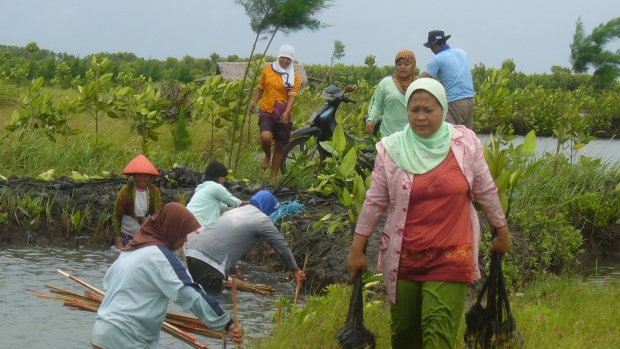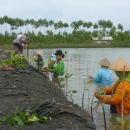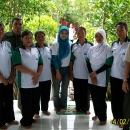Grants :: Small Grant Facilities :: Rehabilitation and Sustainable Use of Mangroves at Pesantren Village
Rehabilitation and Sustainable Use of Mangroves at Pesantren Village

Women beneficiaries planting, Pemalang, Indonesia © Mitra Bahari, 2010
Objectives
This project aimed to increase the income of members of the Mitra Bahari farmers’ group through mangrove planting (20,000 seedlings in a 20 hectare area of fish ponds), environmentally friendly aquaculture (two hectares of chemical-free demonstration fish ponds) and goat farming. The project emphasised community involvement and skills acquisition and roll-out, and involved over 100 villagers, including women and schoolchildren.
Background
Pesantren village (population 10,000) is no stranger to mangrove planting. Since 2004 over 225,000 mangrove seedlings have been planted there by Wetlands International Indonesia, the local Forestry Agency and other partners. Yet the community still faces serious problems, principally flooding (which is worsened by deforestation and destroys fish ponds), decreasing aquaculture yields due to a history of environmentally unfriendly management (excessive use of chemicals, artificial feeds, and so on), and unsustainable use of mangroves, in particular the heavy use of mangrove leaves as goat fodder. The project was designed to tackle these issues by demonstrating best practice in managing mangroves and fish and goat farming.
Target beneficiaries
The Mitra Bahari farmers’ group, local residents and, through roll-out of best practice models, neighbouring communities.
Outputs
- A total of 20,000 healthy mangroves raised and planted on 20 hectares of fish ponds.
- A total of 10,000 black tiger prawns, 4,000 milkfish and four tonnes of seaweed cultivated in two one-hectare eco-friendly demonstration ponds.
- A goat stable established and 20 goats purchased.
- Mangrove rehabilitation training conducted over eight days.
- Communication links established with district government agencies for agriculture and forestry, fisheries, and planning.
- Educational posters and literature produced.
Accomplishments and challenges
The project achieved all of its goals: an increase in farmers’ income, the establishment of pilot fish ponds to demonstrate eco-friendly best practices, mangrove planting, skills training and the dissemination of educational materials. The only major failure was the death of the black tiger prawns, which proved incapable of surviving flooding.
The project significantly raised the visibility of the Mitra Bahari group, one of whom, Suci Purnami, won second place in the national Youth Pioneer in Marine Area Award. The judges were impressed by her knowledge of coastal management and ability to measure carbon values in the environment – expertise gained through project training. Milkfish and seaweed from the demonstration ponds have proved resilient to local conditions and fetch higher prices than those produced by non-organic competitors.
Challenges
The main challenge was extreme weather conditions which slowed project work and killed the black tiger prawns.
Contributions to cross-cutting themes
Communications
The project produced 600 brochures explaining its work and two posters that are on display at the Pesantren Village Wetland Information Centre. The brochures have also been distributed to relevant local and regional government authorities and decision makers.
Gender equality
Women were well-represented in all project activities. Of the 101 participants in training sessions, 37 were women. Members of the Wanita Mitra Bahari (Women of Mitra Bahari) group were trained in carbon-measuring techniques and are active in planting mangroves and making organic fertilizer from goat waste and dead seaweed, both by-products of project activities.
Climate change
Planting 20,000 mangroves was the community’s response to climate change adaptation. Healthy mangroves help to mitigate the impacts of extreme weather events, particularly the flooding and high winds that are major problems locally.
Lessons Learned
Organically raised milkfish and seaweed help to maintain a healthy local environment (by reducing chemical use) and are profitable ventures. The area is unsuitable for black tiger prawn cultivation, however.
Increasing the community’s sense of project ownership is key to achieving sustainability. Also noteworthy are the project’s efforts and success in creating a strong sense of unity in the community.
Project Facts
Country
Location
Pesantren village, Pemalang, Central Java, Indonesia
Topic
- Knowledge for Management
- Civil Society Engagement
- Capacity Building
- Gender equality
- Climate change
- Knowledge management and communications
Duration
4th May 2010 to 4th Apr 2011
MFF Grant Amount
US$27,046 (from a total budget of US$27,922 approved by MFF
Co-financing Partner
Wetlands International Indonesia has long facilitated capacity building in the village, supported mangrove planting activities, and helped to construct a Village Wetland Information Centre. This served as a meeting point and base for MFF grant activities.
Implementing Partner
Eko Budi Priyanto
Project Manager
Kelompok Mitra Bahari
Dusun Sidomulyo RT 08 RW 07,
Jl. Cepuk Barat, Pesantren Village,
Ulujami subdistrict, Pemalang,
Central Java, Indonesia
Mobile: +62 813 70685706
Email: eco.has@gmail.com
“When we planted mangroves during the high tide event, apart from getting all wet as the water was up to our chests, we also had so much fun. It was more than just planting mangroves – it brought us together.”
— WINASIR
HOUSEWIFE (AGE 35)



